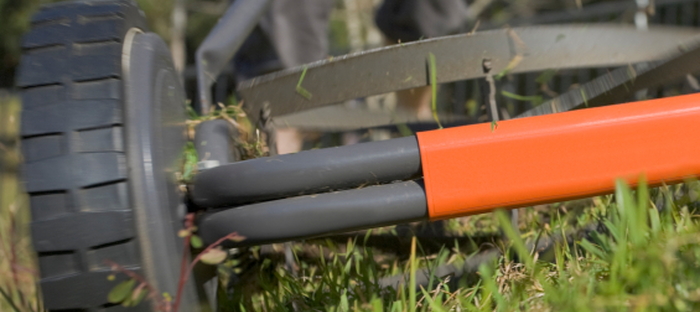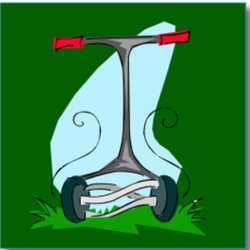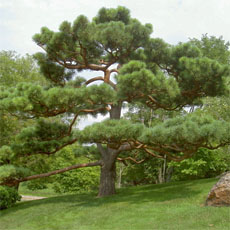Tired of breathing in fumes while you cut the grass? Reel mowers ae a clean, green alternative to your noisy power mower.
There is something soothing about the buzz of a lawn mower in the distance. It calls up memories of summer, fresh cut grass, and evenings spent outside. The sound also evokes the unnecessary use of fossil fuel. It drowns out the other sounds of summer, like birds and bees and your child's laughter.
Reel mowers provide a clean, green alternative. Many lawn owners find themselves returning to the reel mower as their preferred tool for lawn maintenance. How effective are these reel mowers? Can reel mowers work for your lawn? Here are the answers to your questions.
How Long Have Reel Mowers Been Around?
Gasoline-powered lawn mowers are a recent development. Prior to the engine, landscapers and property owners used reel style mowers, scythes, and sheep to keep the grass trimmed. The amount of effort required to cut the grass meant that most people did not maintain lawns. Lawns, as we know them, developed alongside the production and availability of lawn mowers.
The earliest form of lawn mowing was grazing livestock. Sheep, goats, geese and other livestock grazed the areas around people's houses. There was little distinction between yard and pasture. Property managers who cared about a manicured appearance followed behind the livestock with a scythe. Some used a scythe by itself. This meant that lawns were a luxury afforded by the wealthy. The average person did not have time to scythe the grass on a regular basis.
A British inventor named Edwin Budding developed the first mechanical lawn mower in 1830. The idea quickly seized the public imagination. The model was improved upon and widely distributed by several companies in Britain. Lawns allowed people to feel that they existed close to nature. Lawn sports like football and lawn bowling developed, now that it was possible to maintain an even pitch. Suddenly everyone wanted a green backyard. No more scything! Lawn mowers made the backyard dream a possibility. The idea spread from England to America. Soon, animal drawn mowers hit the market, followed by steam-powered lawn mowers and the inevitable arrival of the rotary power mower we know today.
Leonard Goodall invented the power rotary motor in 1940. The popularity of the model is evident in almost every garage in the United States, England, and many other countries. Commercial lawn mowers and landscaping companies sprang up to meet the growing demand for landscaped lawns, backyards, and commercial properties.
What impact has this had on the environment? Americans burn over 2.2 billion gallons of gasoline each year on lawn care alone.
Return Of The Reel Mower
Growing environmental concerns are bringing about a reel mower revival. Reel mowers are an environmentally friendly way to cut your lawn. They also offer significant advantages over power mowers.
* Reel mowers are low impact. They do not compact your lawn the way larger, riding lawn mowers do. Compaction inhibits healthy grass growth which requires expensive lawn aeration.
* Reel mowers do not require gasoline or oil changes. This cuts down on costs at the pump and on maintenance.
* Reel mowers are quiet. You can cut the grass at any time of day or night without fear of waking your family or the neighbors. A quiet mowing experience allows you to enjoy the sounds of nature. Do you have children? Do you worry about not being able to hear them while you cut the lawn? Reel mowers eliminate this worry. They are also better for your ears.
* Reel mowers are safer to operate than power mowers.
* There are no painful vibrations with a reel mower.
Reel mowers are a great alternative to conventional gasoline-powered mowers. Detractors point out that they do have several drawbacks:
* Reel mowers are not self-propelled. This makes them a bit of a workout. The mower only moves as quickly as the operator and some users find it tiring.
* Reel mowers take longer to cut than their riding mower counterparts.
* Sticks, mulch, and rocks jam reel mowers more easily than power mowers. The flip side is that jams are safer to remove in a reel mower than a power mower.
How To Make A Reel Mower Work For You
Reel mowers work best on well-maintained yards. This means yards that are regularly cut and free of objects. Pick up sticks and other debris before attempting to mow with your reel mower. Simply remove the debris in the event that something obstructs the blades. The power behind the reel mower is you. Don't make extra work for yourself. Reel mowers cut shorter grass quickly and effortlessly. Longer grass takes more force on your part. Keeping your lawn at a reasonable length makes operating the reel mower much simpler.
What size is your lawn? Reel mowers come in several bar lengths. Most manufacturers carry 14, 16, 18 and 20-inch bars. The smaller sizes are lighter, making them a good choice for those worried about the weight of the machine. The smaller mowers do require additional passes to mow the yard, whereas the larger mowers require fewer passes.
Reel mowers do not require oil changes or engine care. That does not mean they are maintenance free. Your reel mower is a tool and tools need proper care in order to operate smoothly. Unlike power mowers, you do not need a mechanical background to care for your mower. How do your maintain a reel mower? Follow these five simple steps.
- Cut the grass on a dry day. This protects the blades from rust damage and also makes the grass easier to cut.
- Store your reel mower in a garage, barn, or shed where it is out of the elements.
- Sharpen the blades periodically. Sharpening is easy. Alternatively, you can send the blades away to get sharpened by a professional.
- Grease the gears every few months or if you notice your mower no longer glides effortlessly over the grass.
If you enjoy the peace and quiet of a summer afternoon, love being outside, and are concerned about pollution, then reel mowers are the perfect alternative to a power mower.

















